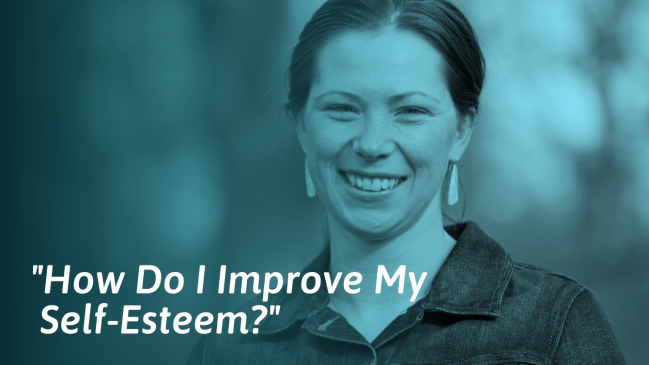“I can’t shake the feeling that I’m worthless and have no good qualities. My self-esteem is very low, and it gets in the way of making friends. What causes low self-esteem, and how can I learn to feel better about myself?”
People with good self-esteem take a positive view of their traits and qualities.[1] Having good self-esteem isn’t the same thing as being arrogant. It’s about accepting and liking who you are, flaws and all.
In this guide, you’ll learn how to identify the signs of low self-esteem, why you might feel bad about yourself, and how to raise your self-esteem.
Signs of low self-esteem in adults
- Sensitivity to criticism: If your self-esteem is fragile, any form of criticism—even if it’s delivered in a calm and respectful way—can feel like a threat.
- Feeling inferior to other people: It’s difficult to feel good about yourself if you’re convinced that everyone is “better” than you.
- Acting superior: It sounds counterintuitive, but some people who feel bad about themselves compensate for their feelings by acting superior.
- Focusing on your flaws: If you spend a lot of time thinking about the things that are “wrong” with you, you may have low self-esteem.
- Difficulty accepting compliments: If you feel bad about yourself, compliments might make you very uncomfortable because they clash with the way you see yourself.
- Negative self-talk: For example, you might tell yourself, “I’m stupid,” “I’m ugly,” or “No one likes me.”
- Putting your achievements down to good luck: Instead of taking credit for your hard work or ability.
- Tolerating bad treatment from others: If you have low self-esteem, you might find it hard to believe that you are worthy of healthy relationships.
- Imposter Syndrome: If you’re a successful person yet often doubt your own capabilities and feel like a fraud, you may have Imposter Syndrome. Research shows that Imposter Syndrome is linked with low self-esteem.[2]
Causes of low self-esteem
Low self-esteem in adults can be caused by one or more of the following:
- Being raised by parents who did not give you enough emotional support or acceptance.
- Frequent criticism from parents, teachers, friends, partners, or people at work.
- Academic problems during childhood. Getting poor grades in school can make you believe that you are “dumb” and will never succeed.
- Past experience of bullying or social rejection.
- Stressful life events. For example, being made redundant or getting a divorce can knock your self-confidence.
- Underlying mental health problems. For example, low self-esteem is common in people with depression.
- Unrealistic media standards that make you feel bad about your body, relationships, or lifestyle.
- Guilt and shame after making a mistake, for example, at work or in a relationship.[3]
- Genetics. Research with twins shows that self-esteem is partly heritable.[4] But this doesn’t mean you can’t raise your self-esteem. It’s a malleable trait, meaning you can change how you feel about yourself.
Here are 17 ways to improve your self-esteem.
1. Discover what matters to you
Getting in touch with your inner values, goals, and aspirations can improve your self-esteem.[5] In psychological terms, this helps you build an “inner compass” that helps you make good decisions and lead an authentic life. Knowing yourself is key to developing internal confidence.
- Think about the people you admire most. What qualities do they have that make them so inspiring? When you’ve identified these qualities, you can try to cultivate them in yourself.
- Reflect on times you felt proud or happy. What kind of choices were you making during that period, and what values were guiding your actions? When you need to make decisions in the future, draw on these values again to help you make the right choice.
- Think about the last time you made a big decision. Did it feel right, or did you go against your personal values and principles? If you go back and do things differently, what choices would you make? Analyzing your decision-making process can help you choose more wisely next time.
2. Don’t rely on positive affirmations
The research on positive affirmations is mixed. According to one study, affirmations can work for people who already have high self-esteem, but they make you feel worse if you have low self-esteem.[6]
A more recent study didn’t replicate these findings. However, the authors concluded that affirmations aren’t very effective.[7] In summary, although they might not do you any harm, there’s no evidence that positive affirmations or mantras will improve your self-esteem.
3. Monitor your self-talk
The way we talk to ourselves can have a significant effect on our self-esteem. If you beat yourself up for making mistakes or being less than perfect, you’ll find it hard to feel good about yourself.
Here are a few tips for tackling negative self-talk:
Evaluate your negative thoughts
Sometimes, negative thoughts lose some of their power when you challenge them. Ask yourself:
- “What is the evidence against this thought?”
- “Am I jumping to conclusions?”
- “What would I say to a friend if they were in my position?”
- “Am I making some unhelpful generalizations?”
Replace unhelpful self-talk with realistic yet compassionate statements
For example:
Negative self-talk: “I’m so stupid! I’m always making mistakes at work.”
Realistic alternative: “It’s true I mess up from time to time. I’m human. Everyone makes mistakes. I can learn from them and improve in the future.”
When you speak to yourself more kindly, you are practicing self-compassion. Many studies have shown that self-compassion can help reduce self-criticism.[8]
Change your perspective
When you are facing a stressful situation, try talking to yourself in the third person (i.e., “She/he feels…” rather than “I feel…”). Research shows that this technique can reduce anxiety and rumination.[9]
Try to use fewer “shoulds,” “musts,” and “oughts”
If you often tell yourself that you should, must, or ought to have done something, you may be judging yourself using unrealistic or unhelpful standards.
This kind of self-talk puts you under pressure to be “better,” but it’s not constructive: it’s just another way to beat yourself up. Instead, try acknowledging your feelings using more compassionate language.
For example:
- Instead of, “I should have known better than to think I could do this project,” try, “The project didn’t go as well as I’d hoped. That’s disappointing, but it’s not the end of the world. I’ll try to do better next time.”
- Instead of, “I ought never to have tried to dress well. I look foolish and feel uncomfortable in this outfit,” try, “I don’t like this shirt as much as I thought. I feel a bit awkward wearing it. But I’m still finding my personal style. I can try other shirts.”
- Instead of, “I must be nicer to my mother next time we get together,” try, “It would be great if I could be more patient with my mother. At the same time, she doesn’t always meet me halfway, and she says some unkind things. I will just try my best.”
4. Set yourself meaningful goals
Setting goals can help you make positive changes,[10] which in turn can improve your self-esteem.
Try to make your goals:
Specific: You need to be able to tell when you’ve met your objective. For example, “I want to be able to run for 30 minutes without stopping” is better than “I want to become a runner.”
Based on adding or changing a behavior: Goals are usually more effective when they are based around positive change (e.g., “My goal is to work out three times every week”) rather than avoiding something (e.g., “My goal is to stop eating chocolate”).[11]
Time-limited: Giving yourself a specific period of time in which to complete your goal can help you stay focused.
Challenging: Research shows that the best goals are achievable but difficult. Choose something that will challenge you without overwhelming you.[10]
What is one small goal you can set for yourself today?
It’s better to start small than nothing at all. Some examples could be to call a friend you haven’t talked to in a long time, go for a jog/walk, or just to do the dishes. Feel free to share your goal in the comments to help inspire others.
5. Tackle your problems head-on
Overcoming life’s challenges can boost your self-esteem because it’s proof that you have the power to change your life.[12]
- Identify the problem. Be as specific as possible. For example, “I’m not very good at handling my money, and I don’t have any savings” is more helpful than “I’m broke” or “I have bad money habits.”
- Decide what a successful outcome would look like. For the example above, you could come up with a realistic monthly savings goal.
- Brainstorm action steps and solutions that could help you solve the problem. For example, if you need help with budgeting or handling your money, you could buy a book or take a course on financial literacy. Or, if you already know the basics of money management, you could focus on saving a specific sum of money.
- If your first solution doesn’t work out as you hoped, try another. If your problems seem overwhelming and you aren’t sure where to start, there’s nothing wrong with getting professional help.
6. Work on improving your body image
Research has shown a link between poor body image and low self-esteem.[13] Body image problems can affect anyone, not just women and girls.
- Try not to say negative things about your body. If your friends start putting themselves down, try diverting the conversation to a more positive topic.
- Work out. Research shows that a single one-hour exercise session can help you feel more positive about your body.[14]
- Use social media mindfully.[15] Stop following accounts and feeds that make you feel unhappy with your body. Research shows that following accounts that promote body positivity might improve body image.[16]
- Get outside into nature. It may sound strange, but according to one study, spending more time outdoors and feel connected to nature may help you appreciate your body.[17]
7. Join groups that matter to you
According to one study, the more groups someone belongs to, the higher their self-esteem.[18] But there’s one condition: the groups must be meaningful to you.[18] Joining a group for the sake of it doesn’t have the same benefits.
This guide on how to meet like-minded people has lots of ideas on how to find groups to suit you.
8. Try not to compare yourself to others
Comparing yourself to people you admire isn’t always a bad thing. Comparing yourself to someone you admire can make you envious, but in some cases, this has an advantage: it can motivate you to make positive changes.[19, 20]
But as a general rule, it’s best to limit the number of comparisons you make. For example, comparing yourself to other people on social media can reduce your self-esteem.[21]
Instead of making comparisons, make an effort to look for, and appreciate, the good things in your life. Research shows that gratitude can boost self-esteem and general wellbeing.[22] Try keeping a gratitude diary. Every day, note down at least 3 things that have gone well.
If you tend to make a lot of comparisons and feel inferior to other people, our article on how to overcome an inferiority complex has some useful tips that will help you break the habit.
9. Do something that scares you
Taking risks can make you feel better about yourself. For example, research shows that taking part in high-risk sports can give you a self-esteem boost.[23]
You don’t have to try extreme sports, but it can help to do something else that feels slightly risky and gives you an adrenaline rush. For example, you could try an improv class or take a course in public speaking.
10. Practice controlling your stress levels
There is a two-way relationship between stress and self-esteem. Low self-esteem is linked to stress, and stress can lower your self-esteem.[24] Some stress is inevitable, but this research suggests that finding ways to relax might help you feel better about yourself.
You could try:
- Journaling
- Meditation and mindfulness practices. There is a positive correlation between mindfulness and self-esteem.[25] If your mind keeps wandering, it can help to try a guided meditation.
- Improving your time management skills if your workload feels unmanageable
- Watching shows or movies that make you laugh or leave you feeling inspired
- Yoga
- Exercise
- Progressive muscle relaxation (PMR) exercises
Verywell Mind has a useful guide to effective stress management techniques.
11. Build healthy relationships
Spending time with people who put you down or make you feel unsupported can reduce your self-esteem. This applies in friendships and in dating.
In a healthy relationship, both people should be able to be honest about what they need and how they feel. If other people take advantage of you and your relationships feel unbalanced, check out this guide on the signs of a one-sided friendship.
Learn the signs of a toxic relationship so you can choose friends and romantic partners wisely. Your friends should be people who want you to succeed. You might find it useful to read our guide to spotting toxic friendships.
Research suggests that if you are single, making a special effort to invest in your friendships can improve your self-esteem.[26] The same study found that when people enter romantic relationships, the quality of their friendships goes into decline. It’s easy to get swept away when you start dating someone you really like but try not to neglect your friendships because they can be important for your self-esteem.
12. Take regular exercise
Aside from improving your body image, regular exercise has several benefits:
- Team sports can give you a chance to meet new friends, which can improve your self-esteem.
- Taking up a new sport or activity is a good opportunity to set yourself some goals. For example, you could set yourself a distance or weightlifting target.
- Exercising outdoors is particularly beneficial for self-esteem.[27] Light exposure can boost your mood. Specifically, research shows that direct sunlight can reduce anxiety, and indirect sunlight (for example, through a window) can reduce feelings of depression.[28]
- Working out can ease the symptoms of depression, which is closely linked with poor self-esteem.[29]
Aim for 150 minutes of moderate exercise every week or 75 minutes of vigorous activity.
13. Let go of your mistakes
Making mistakes can reduce your self-esteem. If you make a mistake that has serious consequences, it can be hard to feel good about yourself again.[3]
- Ask yourself, “How can I stop this happening again?” For example, if you make a mistake in the workplace, could you implement a new or better process to prevent you from making the same mistake again?
- Ask yourself, “Have I learned any useful lessons about myself or about life in general?” For example, you might have learned that you need to become more organized so that you don’t have to make decisions at the last minute.
- Try to stop judging others. It can be easier to stop judging yourself if you train yourself to stop judging others so frequently. When you catch yourself making assumptions about someone else, ask yourself, “Am I leaping to conclusions here? Am I being too quick to condemn?”
- Confide in someone you trust. If you’re close to this person, ask them whether they’ve made any major mistakes in their life. They’ll almost certainly have a few regrets.
- Try to see a mistake as a stepping stone to a new skill or an opportunity for success. Remember that sometimes, it feels more rewarding to succeed after failing than it does to succeed the first time you try.
- Pass on the lessons you’ve learned to someone else. This doesn’t mean you should give someone unsolicited advice, but if they ask for your advice, tell them about your mistakes if you think they could learn from it.
14. Become more assertive
Learning how to be assertive can improve your self-esteem.[30] Assertiveness is a set of skills that helps you stand up for your rights while respecting the rights of other people. [31]
Assertive people:
- Know how to say “No” to unreasonable requests
- Express their feelings in an appropriate way
- Set firm boundaries around what they will and will not accept from others; this is a key skill if you want to know how to improve self-esteem in relationships
- Ask for help when they need it
- Ask other people to change their behavior
The Centre for Clinical Interventions has a free online assertiveness workbook. It’s broken down into bite-size modules and worksheets containing practical tips and exercises.
Our article on what to do if you’re being treated like a doormat contains more tips and examples that will help you become more assertive.
15. Read books on improving self-esteem
See our list of the best self-esteem books for recommendations. Some of these titles are workbooks that contain practical step-by-step exercises, activities, and strategies that show you how to improve self-esteem. Others are based around personal stories, theory, or philosophical ideas but still contain a lot of useful advice.
16. Explore your spirituality
For some people, spiritual practices and beliefs can improve their general well-being and self-esteem. For example, research shows that belief in a supportive, loving higher power is linked with self-worth.[32]
You definitely don’t need to have any particular belief system to be happy with yourself. But if you already identify as religious or spiritual, developing your beliefs in a way that feels comfortable for you could be a useful source of self-esteem.
Belonging to a religious community and attending services can help you meet like-minded people and make friends, which can improve your self-esteem. If you are a member of an organized religion but haven’t attended services for a while, consider rejoining the congregation or trying out a new place of worship that fits your faith.
17. Consider therapy for mental health problems
Depression, anxiety, and other mental health problems often go hand in hand with low self-esteem. It may be easier to build your self-esteem if you seek treatment for underlying problems.
Abuse and trauma can damage self-esteem. Child abuse can cause low self-esteem in adults,[33] and having multiple traumatic experiences can lower your self-esteem.[34]
You don’t necessarily need professional help if you have a history of trauma, but talking to a therapist can equip you with new coping skills and improve your mental health. You could ask your doctor for a referral or use BetterHelp to find an online therapist.
Common questions about building self-esteem as an adult
Does plastic surgery improve self-esteem?
In some cases, cosmetic surgery can help people feel better about their looks. This can improve self-esteem.[35] However, cosmetic surgery doesn’t help everyone. There are many other ways to boost your self-esteem, including setting goals and building healthy relationships.




